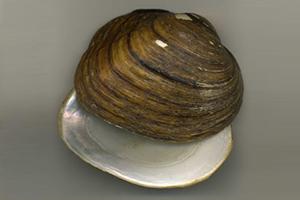Colorado River Mussels
Six at-risk mussels that inhabit the Colorado River basin in Texas – false spike, Texas fatmucket, golden orb, smooth pimpleback, Texas pimpleback and Texas fawnsfoot – have suffered declines.

Mussels are natural filters, laying on the bottom of lakes, rivers and creeks. Freshwater mussels help purify the aquatic systems as they eat, and they’re indicators of good water quality and healthy environments. They also serve as an important food source for many species of wildlife. But freshwater mussels are some of the most imperiled species on the continent. Six at-risk mussels that inhabit the Colorado River basin in Texas – false spike, Texas fatmucket, golden orb, smooth pimpleback, Texas pimpleback and Texas fawnsfoot – have suffered declines. Too many nutrients and sediment in streams and rivers is one of the causes for mussel declines.
With about 95 percent of Texas under private ownership, private landowners have a tremendous opportunity to help mussels and other wildlife species through conservation. NRCS is working with private landowners in the Colorado River basin in Texas to improve water quality to support the species’ recovery.

Landowners in Austin, Bastrop, Blanco, Brazoria, Brown, Burnet, Caldwell, Coleman, Colorado, Concho, Fayette, Fort Bend, Gillespie, Hays, Kimble, Lampasas, Lee, Llano, Mason, Matagorda, McCulloch, Menard, Mills, Runnels, San Saba, Travis and Wharton counties of Texas are helping these at-risk mussels by implementing conservation practices on working lands that contribute to cleaner water downstream.
NRCS offers technical and financial assistance to help landowners improve water quality. This assistance helps producers plan and implement a variety of conservation activities, or practices, that benefit the freshwater mussels and many other species.
Technical assistance is free to producers. The agency’s staff of experts and conservation partners work side-by-side with producers to develop a conservation plan. Each plan focuses on improving water quality downstream and is tailored to the landowner’s property. These plans provide a roadmap for how to use a system of conservation practices to address natural resource concerns while meeting the producer's objectives.
Financial assistance helps producers pay for the adoption of conservation systems that improve the health of riparian ecosystems. Multiple conservation practices are available including prescribed grazing, brush management, range planting, riparian herbaceous cover, streambank and shoreline protection, channel stabilization, field borders and cover crops.
The mussel project is part of the Working Lands for Wildlife (WLFW) partnership, a collaborative approach to conserve habitat on working lands. WLFW provides technical and financial assistance through the Environmental Quality Incentives Program and Conservation Stewardship Program, conservation programs of the Farm Bill, the largest funding source for conservation on private lands.
Habitat restored for these mussels will provide benefits to many other native species, including golden-cheeked warbler, black-capped vireo, monarch butterfly, several species of salamanders, spot-tailed earless lizard and Houston toad.

